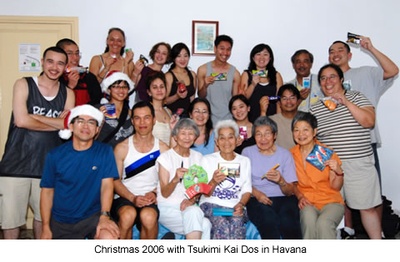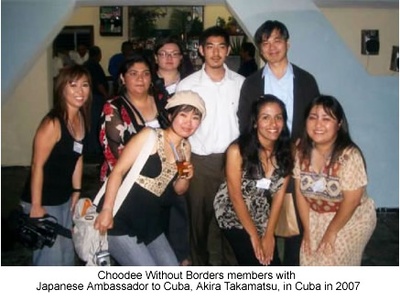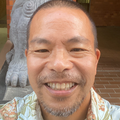The term "Nikkei" can be generally translated to mean "of Japanese lineage," but as the years and generations pass since large-scale overseas Japanese emigration started in the late 1800s, determining what Nikkei means has becoming increasingly complicated.
For example, many Nikkei are descendants of immigrants who left Japan before World War II; how is their identity different from the post-War immigrants and their descendants? Another point to consider is that a proportionally large number of Nikkei are, in fact, from the small island of Okinawa. Further, the Nikkei diaspora is indeed scattered across the world, with the larger portion of it not in the U.S., but in Latin America. Given that we are scattered over space and time, it is difficult if not impossible to define Nikkei based on purity of blood, ancestry, or culture.
However, despite the displacement, dispersion, and diversity that characterize the history of the Nikkei diaspora, there is still a mutual yearning to reconnect across the distance. On September 6, 2008 at the Japanese American National Museum, three Nikkei groups from Northern and Southern California (Tsukimi Kai, Nikkei for Civil Rights and Redress (NCRR), and Choodee Without Borders) will share stories about their visits to the Nikkei communities in Cuba.
Nikkei for Civil Rights and Redress (NCRR)
NCRR sent a delegation of 18 people to Cuba in August 2001 to share our histories and to participate in the Obon on the Island of Youth (Isla de la Juventud). A year earlier, NCRR had sponsored a California tour for Francisco Miyasaka of Havana who was able to share the 100-year history of Japanese in Cuba with gatherings in Los Angeles, San Francisco and Oakland and who suggested that we continue the exchanges between our communities. With the generous support of the community, the delegation was able to bring Japanese foods and medicines to Cubans in Havana and on the Isla. Under the cultural leadership of Nobuko Miyamoto of Great Leap, the group shared music and Obon dances with the Cuban Japanese. NCRR learned not only about the incarceration of the Issei on the Isla but also about the contributions of the Cuban Japanese to the revolution and how many Nisei were able to go to college and improve their lives. NCRR had hoped to continue the exchanges by bringing two Cuban Japanese women to the United States in 2002 but was unable to do so due to the increasing restrictions on travel to and from Cuba but especially for people from Cuba.
Tsukimi Kai
Tsukimi Kai was formed by Nikkei in Northern California who had been in contact with NCRR. The first Tsukimi Kai trip to Cuba was in August 2005. It followed in the footsteps of NCRR by bringing supplies to Cuba and sharing in music and dance. This first group brought taiko drums that they had constructed in the Bay Area and used them for performances in Cuba. On La Isla they participated in Obon and attended a peace conference to commemorate the bombings of Hiroshima and Nagasaki. The second Tsukimi Kai group went to Cuba from December 2006 to January 2007. Three of the members of this second trip were Nisei who exchanged stories of wartime incarceration with Nikkei in Cuba. This group brought supplies including mochiko and made an Okinawan shiisaa (lion) dance costume that it used for celebrations of Oshogatsu and other performances in Cuba. Members in both Tsukimi Kai trips also recorded oral history interviews of Nikkei Cubans and produced DVD’s about their trips. The fiscal sponsor of Tsukimi Kai is the National Japanese American Historical Society.
Choodee Without Borders
Choodee Without Borders is the first Okinawan American delegation formed with the intent of connecting with other Okinawan choodee worldwide. (Choodee is the word for “sibling” in the Okinawan language.) The group first formed with seven members from both the east and west coasts under Akiko Kakazu on the occasion of the 100th anniversary celebration of Okinawan immigration to Cuba in October of 2007. The relationship and dialogue began with the Cubanchu (Okinawan-Cubans) during the celebration planning with Antonio Yohena, president of the Cuba Okinawa Kenjinkai and their members. It is the group's greatest hope that the friendship as well as the exchange of cultural materials and resources will continue for a long time to come. The Choodee Without Borders has expanded its members and continues on their path to strengthen ties between Uchinanchu (Okinawan) abroad and from the U.S. Most recently, some of the members traveled to South America where they attended Brazil and Argentina's 100th Okinawa immigration celebration. In Sao Paulo, they made a presentation at the Youth Exchange Program as part of the centennial program in August 2008.
Members of each panel will talk about their trips to Cuba as well as show video clips of their trips to Cuba. Maki Tanaka, a Ph.D. candidate in Sociocultural Anthropology at the University of California, Berkeley, will moderate the program. She has just finished her fieldwork in Trinidad, Cuba. Her research focuses on the preservation of World Heritage Sites and tourism promotion in post-Soviet socialist Cuba.
The program will be from 2 pm to 4 pm and be followed by a light reception with special cultural performances. Click here for program details. The event is free with Museum admission. Call (213) 625-0414 ext. 22222 or e-mail rsvp@janm.org (subject: Nikkei in Cuba)
© 2008 Wesley Ueunten






